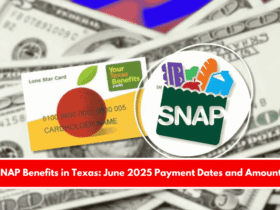There’s been a lot of buzz online about the possibility of a new stimulus check arriving in June 2025, but the reality is quite different. While rumors have circulated on social media, it’s important to clarify that there are no confirmed plans for a new federal stimulus check.
The End of the Previous Stimulus Checks
To begin with, it’s important to note that the previous rounds of stimulus checks—those from 2020, 2021, and the 2021 Recovery Rebate Credit—have already come and gone. The deadlines for requesting those payments are long over:
- The final deadline for claiming the $1,400 third stimulus check was April 15, 2025. If you missed it, unfortunately, that money is no longer available.
Even if you missed the chance to claim a past check, there are no options to appeal or request those funds after the deadline. So, if you missed the chance to file a tax return to claim the third check, that payment now belongs to the U.S. Treasury.
The Fourth Stimulus Check: Fact or Fiction?
You may have heard rumors about a fourth stimulus check worth $2,000. While it sounds promising, there is no official confirmation from Congress or the IRS. In fact, it’s likely just misinformation or even a scam. There is no plan for a new federal stimulus check to be issued at this time.
Be cautious with what you see on social media or certain websites—these could be efforts to mislead or scam you. It’s always best to rely on trusted sources for financial news.
The DOGE Dividends: What Happened?
Another widely discussed topic was the supposed DOGE stimulus checks or DOGE dividends, which gained attention after some discussions involving Donald Trump and Elon Musk. The idea was that the Department of Government Efficiency could return savings to taxpayers, potentially offering up to $5,000 per taxpayer through “DOGE Dividends.”
This concept was floated by James Fishback, the head of investment firm Azoria, who proposed a tax refund idea based on supposed savings by the government. Elon Musk even commented on the idea, but this was more of a theoretical proposal rather than something real. Since then, Musk has announced he is leaving DOGE, essentially ending any potential plans related to DOGE Dividends.
With Musk and Trump now at odds, the entire concept of DOGE Dividends has pretty much fizzled out, making it clear that this was never going to become a reality.

Alternatives to a Federal Stimulus Check: What Can You Do Now?
With the likelihood of a new federal stimulus check fading, you may be wondering what options remain for those needing financial relief. Fortunately, there are still some programs and alternatives available, particularly at the state and local levels.
Guaranteed Income Programs (GIPs)
Unlike one-time stimulus checks, Guaranteed Income Programs (GIPs) offer regular monthly payments for a set period, which can range from six months to two years, depending on the program. These programs are designed to help low-income individuals and families stay afloat in difficult times.
For example, Magnolia Mother’s Trust in Jackson, Mississippi, provides $1,000 per month for an entire year to low-income Black mothers. The program also offers college savings and mental health support. Look into whether your state or county offers similar programs to help support families in need.
State Tax Refunds and Credits
Another potential source of financial relief is state tax refunds. Many states have their own forms of sales tax refunds, credits, or rebate programs that can provide money back to eligible residents. While these aren’t as widely advertised as federal stimulus checks, they can still make a difference.
For instance, in Colorado, eligible residents can receive a TABOR refund for the 2024 tax year. Single taxpayers can receive up to $565, and joint filers can get up to $1,130. To receive this, you must file your state income tax return or Property Tax Credit (PTC) application.
If you’ve already filed your 2024 state tax return, your TABOR refund will be sent along with your tax refund. This is a great example of how state-level programs can provide relief, so it’s worth checking to see if similar options are available in your state.











Leave a Reply